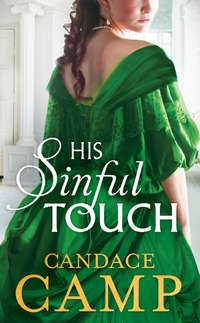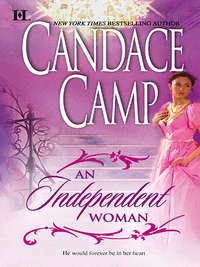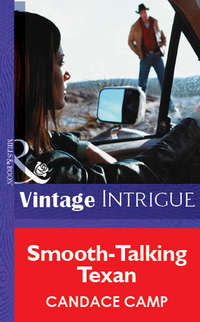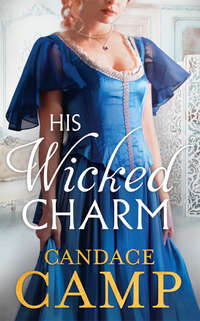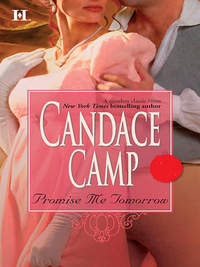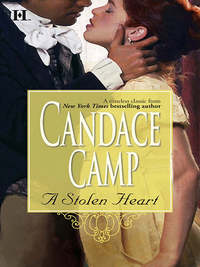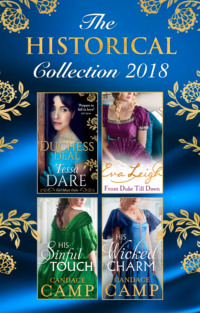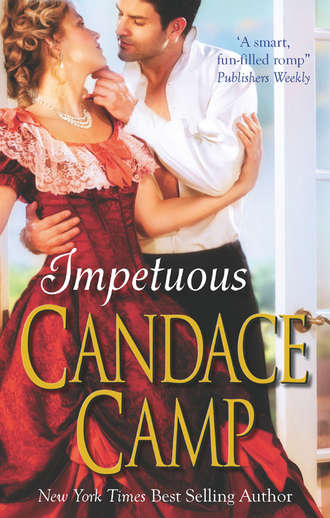
Полная версия
Impetuous
“Olivia...manners,” Cassandra reminded her absently. She smiled at her siblings, tears lurking at the corners of her eyes. “I knew I could count on you.”
Olivia bounced off the bed to hug her, and even the boys followed suit. Cassandra hugged them tightly to her, promising herself that she would not let them down. Somehow, some way, she would find those letters, and she would make Sir Philip believe her.
* * *
AUNT ARDIS DID not approve of Cassandra and her siblings visiting their old home. In the time that Cassandra had been there, the older woman had become accustomed to Cassandra’s taking from her shoulders many of the dreary tasks of running a household. As long as Cassandra stayed within her tight budget, Aunt Ardis was pleased to see the quality of their meals and the work of the servants improve. Though she told herself that of course she could have accomplished the same things had she spent the time and effort, she much preferred to spend her time on her toilette or gossiping with one of the two or three ladies in the area whom she considered of a social standing equal enough to hers.
As a result, it was most inconvenient when Cassandra took time off from her household duties to spend a whole day at Chesilworth. “I cannot imagine what you find to do there all day,” she told her niece petulantly. “The place is falling into ruins.”
Cassandra had carefully kept hidden from her aunt any hint of what they were really doing at Chesilworth. She wasn’t sure how Aunt Ardis would feel about their hunting for treasure, but she was sure that the lady would at the very least dismiss the idea as nonsense and might even go so far as to forbid her nieces and nephews from going to Chesilworth. So she replied only, “I would like to stave off the ruin if I can. I clean up a little around the place, walk through it checking for leaks—things like that.”
Her aunt looked at her as if she had taken leave of her senses. “I would think your time would be better spent here. This is your home now.”
Cassandra curled her hands into her palms but forced her voice to remain even. “Of course, Aunt Ardis, but Chesilworth is still Crispin’s inheritance. I must try to make sure that there is something left for him when he gets older. It would be too much to ask that you and Uncle Barlow continue to bear the burden of upkeep for all four of us, even when the boys are grown.”
Aunt Ardis looked taken aback by this thought. “I—well—yes. I mean, if you must, I suppose you must. But this wanting to go every single day...”
“Only when you don’t need me, of course, Aunt Ardis.”
As it turned out, her aunt usually managed to find that she needed her three or four days a week, but the other times, Cassandra and her siblings hiked over to their old home and climbed up into the musty old attics, continuing their methodical exploration.
Cassandra did most of the work, for the boys, though eager, tended to become distracted by some odd object or other or fall into an argument over some prize they found, and Olivia, too, often grew tired and thirsty and decided to take a rest outside. Still, they did make progress, and as they worked, they found that they were moving into older and older periods of dress and furniture, which kept Cassandra’s hopes up. While Olivia whooped over the elaborate tall wigs and wide, almost-flat cages of hoops that had been worn under dresses in the 1700s, Cassandra continued doggedly to dig, thinking with determination that they were not that far away now.
She was particularly eager one morning to get over to the old mansion, but it seemed as if everything interfered with it. Her aunt wanted her to do first one thing, and then another until the morning was almost gone. Then there was a crisis belowstairs, which she was called upon to resolve. Finally, just as she was about to go upstairs and change into old clothes suitable for cleaning out the attics, the butler opened the door to the sitting room and announced that they had a visitor.
“Mr. David Miller, ma’am,” he told Aunt Ardis in a frosty accent that usually indicated he did not entirely approve of the visitor, and handed her the man’s card on a small salver.
“Who?” Aunt Ardis looked blank.
“An American, I believe, ma’am. He says—” his tone indicated his personal disbelief “—that he is related to Lord Chesilworth.”
“Lord Ch—you mean Crispin?”
“Yes, ma’am.”
Aunt Ardis and Joanna turned to stare at Cassandra, who shrugged, as puzzled as they. “I have never heard of him, Aunt Ardis.”
“Well, hmm...I suppose we must see him, Soames.”
As soon as Soames was out the door, Aunt Ardis turned toward Cassandra. “An imposter?” she suggested. “An American claiming to be a relative of yours?”
“I suppose someone in the Verrere family could have emigrated,” Cassandra mused, frowning.
“No doubt he thinks that Chesilworth, just because he has a title, is a wealthy man. He’s hoping to get money out of you, mark my words.”
“He will be mightily disappointed, then,” Cassandra remarked cheerfully.
A moment later Soames reentered the room, intoning, “Mr. David Miller.”
A young man followed him into the room and paused, smiling tentatively at the three women who sat there. He was in his twenties, with sky blue eyes, a thick mop of blond hair and a rakish mustache, which Cassandra suspected he had cultivated to age his boyish countenance. He was dressed fashionably, but not glaringly so, and Cassandra judged him to be a respectably handsome man. Her opinion was confirmed by the sudden flare of interest in Joanna’s eyes.
Mr. Miller bowed to them. “Please pardon my intrusion. I know I should have written to introduce myself, but when I found myself in London with unexpected time on my hands, I was seized by the urge to meet my British cousins. I hope you will not think me overly bold.”
“Pray sit down. I am Miss Cassandra Verrere,” Cassandra introduced herself. “My brother is Lord Chesilworth, but I am afraid he is still only a lad. This is my aunt, Mrs. Moulton, and her daughter, Miss Joanna Moulton.”
The young man bowed over each of the ladies’ hands politely before taking his seat. “It is the Verreres to whom I am related—quite distantly, of course,” Mr. Miller explained eagerly. “One of my ancestors was a Verrere. She and her husband settled in Boston, oh, almost two hundred years ago.”
“What?” Cassandra stared. “But what—what was your ancestress’s name?”
“Margaret Verrere. Family legend has it that it was a most romantic affair—she eloped with a man of common birth, and they fled the wrath of her family to the colonies.”
“I cannot believe it.”
“Oh, ’tis true,” David Miller assured her earnestly.
“No, I did not mean that I don’t believe the story about Margaret Verrere. It is just that—well, it is so astonishing. You see, I have been reading her journals.”
He grinned. “Splendid. I hope you enjoyed them. I am the one who sold them to Mr. Simons. I am a merchant in Boston, and every once in a while I come to London to make purchases, see the latest things, you know. Last year I decided to bring Margaret Stone’s journals—that was her married name, you know—to London and sell them. I sold them to a bookseller named Simons. This year, when I went by to see him, just to renew the acquaintance and see whether he had sold the journals, he told me that Lord Chesilworth, a Verrere himself, had bought them. I was most pleased to hear that they had found their way back to their proper family. Of course, I realized that we must be distantly related, and, well, when I had some free time on my hands, I felt that I must make your acquaintance.”
“I am so glad that you did.”
Joanna, who had lost most of her interest in the handsome young man when she learned that he was a mere merchant from Boston, was even more bored by this talk of books and ancestors. Properly, this young man, whatever his reasons for coming to Dunsleigh, should have been so captivated by her beauty that he talked of her, not musty old journals and dull relations. She stirred restively in her seat.
“Wonderful.” Mr. Miller beamed. “I was afraid that you would find me too presumptuous. I find that the English often seem to find Americans so.”
“I am very glad to meet you. I find Margaret’s story fascinating, as did my Papa. It is he who was the Lord Chesilworth who bought them from Mr. Simons. But I am afraid that Papa passed away several months ago. He would have been so delighted to meet you. He would have had many questions about the journals.”
“Must we talk about books, Cassandra?” Joanna asked plaintively.
“I am sorry, Miss Moulton.” Miller favored her with a smile. “Indeed, no doubt you found it boring, hearing two people talk about their relatives. I take it that you are not a descendant of Margaret’s family.”
“I haven’t the faintest idea who Margaret is,” Joanna said with a little giggle that more than one swain had assured her was delightful.
“No, my cousin and aunt are not Verreres,” Cassandra explained. “We are related on my mother’s side.”
“I see.”
“But tell me, Mr. Miller, pray, how did you come upon the journals and why did you decide to sell them?” Cassandra wished that Sir Philip Neville were here now to hear the full story of the journals. He had been so certain that poor Mr. Simons had played them false—perhaps Mr. Miller could put his mind to rest about the journals’ authenticity.
“My mother died almost two years ago. It was through her that I was descended from Margaret Verrere Stone. My grandmother, her mother, had been very interested in the family history, and she had preserved many old family records—family Bibles, birth and death and wedding certificates. Anyway, she had several trunkfuls of such things, which my mother had merely stored in the attic. But then, when my mother departed this world, I was going through her things, and I came upon my grandmother’s trunks. They were stuffed with old family relics, most of which I decided to get rid of. Among those things were Margaret’s journals.”
Glassy-eyed by now, Joanna seized the opportunity of a pause in Mr. Miller’s recital to say, “Perhaps you could show Mr. Miller the garden, Cassandra. Americans are always interested in English gardens, aren’t they?”
“I am sorry, Miss Moulton. I fear I am boring you with such talk. It is just that I am so thrilled to be meeting a, well, a sort of cousin, I suppose.”
“You are right, Cousin Joanna.” For once, Cassandra thought, her cousin’s wishes and her own coincided. It was always difficult to carry on a serious conversation with Joanna around, flirting and simpering and determined to keep the conversation on the one thing that truly interested her, herself. “I would be pleased to show Mr. Miller the garden. Would you care to continue our conversation there, sir?”
He agreed with alacrity, and Cassandra led him out into the formal garden behind the house. He courteously admired the various roses, delphiniums and daisies, and then he and Cassandra settled down on the bench in the grape arbor.
“Tell me the rest of it,” Cassandra urged. “Did you read Margaret’s journals? Why did you decide to sell them?”
Miller’s blue eyes twinkled. “No doubt you will consider me a crass American, Miss Verrere, but the truth is, I have little interest in books or in searching out each twig of the family tree. I found it rather intriguing to learn that there were still Verreres here in England to whom I was distantly related, but as for studying the family history—well, I’m afraid I haven’t either the time or the inclination.” He gave her a small, self-deprecating smile.
“That is perfectly understandable. I don’t expect everyone to share my interests. So you did not read the journals?”
He shook his head. “Not really. Oh, I glanced through them, but I read very little. I didn’t know what to do with them at first. I hated to throw them away. I mean, they were so old, and I thought they must be valuable to someone. Finally one of my friends suggested that I sell them in England the next time I went. He pointed out that the English were, in general, more interested in history. He thought it would be a perfect market for old books, especially since Margaret came from here and doubtless left family behind. So I took his advice and brought them with me on my last trip to London. There, as I said, I sold them to Mr. Simons.” He smiled and added, “Actually, I tried to sell them to several book dealers, but Mr. Simons was the only one who wanted them.”
“I am so glad you did,” Cassandra told him warmly. She found herself liking Mr. Miller. He was open and direct in a way that most people never were. She wasn’t sure if it was simply an American quality or an attribute of this man. Whatever it was, she found that she could not keep from smiling back at him whenever he smiled. He was also, she thought, quite handsome—better looking, in fact, than Sir Philip Neville.
“My father was thrilled to actually get to read Margaret Verrere’s words,” she continued. “Her history—the elopement—had been a particular interest of his.”
They continued to talk for some time. He was interested in Margaret Verrere’s family, his relatives, and what had happened to them in the years since Margaret eloped. When Cassandra told him that the home in which Margaret had lived was still standing and had indeed been Cassandra’s own home until her father’s death, he was struck with awe and asked her if he might see it.
Cassandra was quite happy to show Chesilworth to him, and they went that afternoon, accompanied by the twins and Olivia, who always welcomed any excuse to get away from their aunt’s house. The twins, of course, peppered David with questions about the United States as well as the ship on which he had come to England, but he answered them all with great patience.
“Are you going to hunt for the treasure with us?” Hart asked with excitement when they reached Chesilworth.
“The what?” He looked down at the boy, startled, then over at Cassandra.
“The dowry,” Hart went on impatiently. “You know. Margaret’s dowry.”
“He’s talking about something in the journals,” Cassandra explained, adding to her brother, “Mr. Miller did not read the journals.”
“There is a treasure mentioned in them?” The American looked intrigued.
“It tells how to find it,” Crispin told him, and the two boys began to eagerly explain the existence of two maps. “One is in a letter. That’s what we are looking for in the house. The other belongs to Sir Philip, but he refuses to help us, so we are going to have to figure out how to do it ourselves.”
“A treasure hunt!” David Miller exclaimed. “How delightful. I am sorry that I cannot stay longer and help you with it.”
“Yes, that would be bang-up,” agreed Hart, who, along with Crispin had liked their American relation from the moment they met him.
“Why don’t you stay?” Crispin suggested. “Couldn’t he stay, Cassie?”
“He might not be able to, boys. Don’t plague Mr. Miller.” She turned to the man with a smile. “If you were able to stay, though, we would greatly enjoy it.”
“You tempt me.” He sighed. “But I do have business in London that I must get back for. And my ship home sails in a week.” He looked torn for a moment, then shrugged and said, “Well, perhaps I could stretch my stay to a second night.”
When they reached Chesilworth, Mr. Miller exclaimed aloud, impressed by its size and age, “Why, it’s a castle!”
“Hardly.” Cassandra laughed. “The Verreres were not great land barons during the Middle Ages, but the Elizabethan who built this tried his best to make it look like one.”
“You won’t find anything like this in the United States,” he told her, still in awe. “It’s a grand place. You must have hated to leave it.”
Cassandra nodded, though it wasn’t its grandeur that made her miss Chesilworth. It was its dear familiarity and its memories, the sense of family history that lived throughout it. They showed Mr. Miller through Chesilworth, even the damp and deteriorating west wing, and the next afternoon he returned to help them search the attics. In the end, he wound up stretching his visit to yet a third day, and it was with visible reluctance that he left them then.
After his departure, the days at Moulton House settled into their usual routine. Cassandra oversaw most of her aunt’s housekeeping, and whenever she could, she sneaked away to Chesilworth, sometimes with her siblings and sometimes without.
One afternoon, about a week after Mr. Miller departed, all four of the Verreres were in the attic at Chesilworth, though only Cassandra was still looking through the trunks. The heat of the day and boredom had prompted the twins to engage in a pretend sword fight with two canes they had found against the attic wall, and Olivia stood by an open window, trying to find any stray bit of breeze.
Cassandra finished loading all the objects back into a trunk that she had just emptied and closed the lid, sending another shower of dust all over her. She coughed and sat back on her heels, drawing her hand across her forehead and sighing. Her back hurt, and she badly wanted a drink of water. She coughed again and thought about quitting the search for the day.
To her amazement, there was a sound in the hall below the attic stairs. Then her cousin’s voice rang out cheerily, “Cassandra! Oh, Cassandra!”
Joanna? Whatever had possessed Joanna to come all the way over to Chesilworth? It was not like her cousin to move an inch out of her way, let alone visit their dilapidated house. There were footsteps on the stairs, and a man’s head and shoulders appeared through the hole in the floor. Cassandra understood now why Joanna had gone to the trouble of coming to Chesilworth. She rose to her feet, staring in silence as the rest of the man came into view.
“Good day, Miss Verrere,” said Sir Philip Neville cheerfully.
Chapter Five
“SIR PHILIP!” CASSANDRA gaped at the man.
“Miss Verrere. It is a pleasure to see you again.” A twinkle danced in Neville’s brown eyes.
Cassandra was intensely, humiliatingly aware of the way she looked—sweating in a most unlady-like manner, covered with dust, wearing one of her oldest and most ragtag dresses, and her hair no doubt sticking out every which way. She looked past Sir Philip to the attic opening, where Joanna now stood, a smug smile playing on her lips. Cassandra felt as if she could cheerfully have murdered her. No wonder Joanna had gone to the trouble of coming over to Chesilworth. She had known the state in which she and Sir Philip would find Cassandra.
Cassandra rose to her feet with all the dignity she could muster, trying vainly to brush the dust off her hands onto her skirts. “I—this is indeed a surprise, Sir Philip. I had not expected to see you again, least of all here.”
“My visit to Lady Arrabeck’s was over, and I was returning home, when it occurred to me that Dunsleigh would be a pleasant place at which to make a stop.”
“How fortuitous that we lay on your way home,” Cassandra replied, bringing up a mental map in her head and placing Lady Arrabeck’s, Dunsleigh and Neville’s Haverly House on it. It seemed to her that no one in his right mind would go through Dunsleigh to travel from Arrabeck Hall to Haverly House.
“Yes, isn’t it?” Neville returned blandly.
He had to be here about the treasure. Cassandra was certain that his story about dropping in on his way home was utter folderol, even if Joanna was too poor at geography to realize it. She was grateful, though, that he had been smart enough not to tell her aunt or cousin the real reason for his visit.
He crossed the attic to where she stood, winding his way among the boxes and trunks, and bowed elegantly over her embarrassingly dusty hand.
“Please forgive my appearance,” Cassandra murmured. “’Tis dusty work in the attics.”
“I see.” A flash of amusement crossed his face. “But there is no need to apologize. You look, as always, enchanting.”
Cassandra felt a betraying heat rise in her cheeks and she glanced quickly away. “Uh—I—allow me to introduce you to my sister and brothers.”
The twins had stopped their mock battle as soon as Neville had arrived, and they edged closer now, staring at him in fascination.
“My brother Crispin, Lord Chesilworth, and his twin Hart. And this is my sister, Olivia Verrere. Children, this is Sir Philip Neville.”
Neville exchanged polite greetings with the other three, adding as he bowed over Olivia’s hand, “Ah, another beauty in the family, I see.”
Olivia’s eyes grew even wider, and Cassandra knew that he had won her sister over. Behind them, still standing beside the attic stairway, Joanna shifted and sighed noisily. She unfurled her fan and made a production of waving it in front of her.
“It is so dreadfully hot in here,” she opined. “Cassandra, I don’t see how you can stand it. I swear, I think I should faint.”
“Oh, you know I am never subject to the vapors,” Cassandra answered her pragmatically. “But perhaps you should go back downstairs, where it is less stifling.”
“Yes, of course.” Joanna gave her a cat-in-the-cream smile and went on in dulcet tones, “We ought to return to the house, Sir Philip. Cassandra and the other children could join us when they get through here.”
“Thank you for your concern, Miss Moulton.” Sir Philip sent her a brief, disinterested glance. “No doubt you should return to the house if you are feeling unwell. However, I shall remain here. Miss Verrere looks as if she could use some help.”
Joanna stared at him. “You are going to help them clean the attic?”
“If that is what they are doing, yes.” He gave her a perfunctory smile and turned back to Cassandra.
“But I—I can hardly go back to the house by myself,” Joanna protested.
“Your groom was with us.”
“Yes, of course, but that isn’t the same. I mean, he is not a gentleman.”
“You do not trust your servants to behave in a proper manner?” Neville asked, lifting his eyebrows in surprise.
“Of course—I didn’t mean—that is—”
“If you are scared to go back with Jessup,” Olivia suggested with great innocence, “then perhaps you had best wait downstairs. I am sure we will be through in a few hours. Won’t we, Cassie?”
Cassandra had to bite her lip to keep from giggling at Joanna’s outraged expression. “Yes. Joanna, that sounds like an excellent idea.”
Joanna cast a fulminating glance at Cassandra, then at the others, and finally stalked ungraciously to the nearest trunk, lifting her skirts from the dusty floor. She put on a show of dusting off the top of the trunk with her handkerchief, but it was lost on Sir Philip, who was once again looking down at Cassandra.
“Where shall I start, Miss Verrere?”
“Ah...” Cassandra glanced around vaguely, trying to pull her thoughts together. “Well, I had just finished this trunk, and I was going to move on to the one beside it. Perhaps you would like to go through that one.” She pointed to the flat-topped, brass-bound trunk on the other side.
“Of course.” He moved to the next trunk and opened it, sending dust cascading from its top.
Cassandra knelt in front of the trunk beside him and opened it. She glanced over at Sir Philip, still scarcely able to believe that he was there. Her initial embarassment over her appearance was subsiding. It didn’t really matter how she looked; what was important was that he had come.
Quietly she asked, “You have decided that you believe me, sir?”
“I never disbelieved you, Miss Verrere. I was simply of the opinion that you had been duped.”
“A vast improvement. You merely thought me a fool.”
He looked at her, his eyes dancing. “Never that, dear lady.”
“What made you change your mind?”
He shrugged. “I am not saying that I believe there is a treasure waiting for us, or that we can find these maps that will lead us to it. Let us simply say that for the moment I am willing to withhold my judgment.
The fact was—though he would not have dreamed of telling Miss Verrere this—that Sir Philip still found the idea of a hidden treasure and a secret map or two the stuff of gothic novels. He had merely found himself excessively bored at Lady Arrabeck’s house party after Cassandra left. He had kept thinking about her and the offer she had made to him. Absurd as it was, it somehow intrigued him. But more than that, Cassandra herself intrigued him. He recalled the intelligence and clarity of her large gray eyes, the humor of her wide mouth and the slender femininity of her form. He had never gotten a good look at her pale hair in the daylight, he reminded himself; he would still like to see it. And their conversation, though bizarre, had made what everyone else said to him seem insipid. Most of all, he remembered the way Cassandra had felt in his arms, the taste of her mouth beneath his, and the memories made him feel most unsettled.


